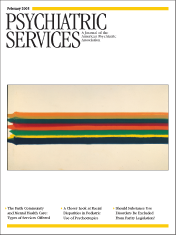Racism and Mental Disorders
To the Editor: I am obliged to write about the Taking Issue piece in the December 2004 issue in which Carl Bell (1) raises the question of whether racism should be considered a symptom of a psychiatric disorder or a disorder in itself.
Certainly it is high time that racism is mentioned in the DSM classification scheme. However, the consequences of racism need looking into, not the perpetrators. I am really worried by Dr. Bell's insinuation throughout the article that perpetrators of racism have a mental disorder without mention of the millions of lives that have been ruined by racism. The insinuation is akin to making excuses for Nazism while denying that the crimes of the Nazis ever existed. Racism does not deserve to be beatified by a DSM classification. Instead, the appropriate DSM code should be given to the mental anguish that victims of racism suffer.
May I suggest "post-racist attack syndrome" or "post-racism syndrome"? DSM criteria might include: A. The person should have suffered from racial discrimination—institutionalized or otherwise, direct or indirect, conscious or unconscious—for a substantial portion of his/her lifespan. B. As a result of (A), the person will have demonstrated loss of faith in the society leading to one or more of the following: 1. Lack of motivation; 2. Withdrawal from the majority race or the perpetrator's group; 3. Distress or impairment in social, occupational, or other important areas of functioning; 4. Clinical depression; 5. Conscious selection of occupations or leisure activities that will not expose him/her to reminders of the perpetrators or where he/she expects no discrimination. C. The above is notdue to the direct consequence of another mental disorder, substance abuse, or medication or to a general medical condition.
Dr. Okoro is a staff psychiatrist in the department of psychiatry at Memorial University of Newfoundland in St. John's, Canada.
1. Bell C: Racism: a mental illness? Psychiatric Services 55:1343, 2004Google Scholar



